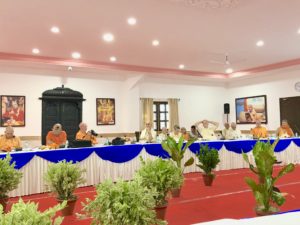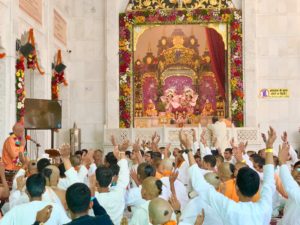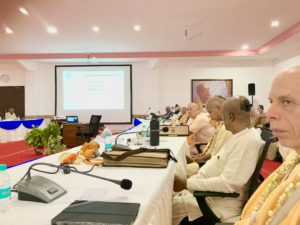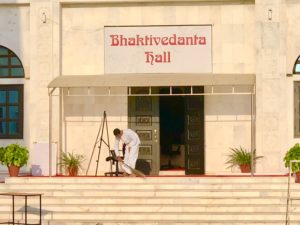Every devotee should have the TOVP App on their phone. With over 2,000 users to date receiving regular news and updates through Push Notifications, access to the TOVP website, Facebook Page and Youtube Channel, everyone can stay in touch with this most important ISKCON project on a daily basis.
The MISSION 22 MARATHON is full steam ahead to complete the TOVP by 2022 and we need to all work and pray together for the fulfillment of this combined offering to Srila Prabhupada of his dearmost desire to manifest the Temple of the Vedic Planetarium. Become a TOVP Ambassador and tell all your devotee friends and relatives to get the TOVP App also.
Simply go to Google Play on your phone, type in TOVP and download the App. At this time the App is only available for Android and iPhone.
Reviews
“It’s amazing to get up to date developments, shows great efforts made for service and enthusiasm.”
“It gives real life experience. Wonderful. Thanks Srila Prabhupada & his dedicated servants.”
“This app is very convenient to stay updated with the temple project.”
“One stop application for devotees like us. Haribol, Hare Krishna!”
“Extremely nice & helpful….may Lord Gaur Nitai bestow all their mercy upon the devotees.”
“Jai..Thanks for current and live updates!”
“One of the best apps to get connected to Srila Prabhupada’s dream home and family.”
“TOVP I’m keeping this app.”
“Loved it Jay Gaura Nitai.”
“Totally awesome.”
TOVP NEWS AND UPDATES – STAY IN TOUCH
Visit us at: www.tovp.org
Follow us at: www.facebook.com/tovp.mayapur
Watch us at: www.youtube.com/user/tovpinfo
Phone App at: http://tovp.org/news/announcements/new-tovp-phone-app-goes-live/
Mailing List at: https://goo.gl/forms/ojJ2WcUUuqWh8bXt1
Support us at: www.tovp.org/donate/seva-opportunities
The post Get the TOVP App and Stay in Touch appeared first on Temple of the Vedic Planetarium.



 Mayapur Times is a newsletter of the Sri Mayapur Candrodaya Mandir. The newsletter aims to inform and inspire the local ISKCON community by reporting monthly activities, events, developments and news.
Attached is Issue Two: August 2018.
Mayapur Times is a newsletter of the Sri Mayapur Candrodaya Mandir. The newsletter aims to inform and inspire the local ISKCON community by reporting monthly activities, events, developments and news.
Attached is Issue Two: August 2018. 
 By Bhakti Raghava Swami
By Bhakti Raghava Swami This event will focus on the training and organization of 10 Action Teams composed of dedicated community members to address the focus areas that have emerged from the NRR Community Survey and its analysis during Conferences 1 and 2.
This event will focus on the training and organization of 10 Action Teams composed of dedicated community members to address the focus areas that have emerged from the NRR Community Survey and its analysis during Conferences 1 and 2. 







 By the TOVP staff
By the TOVP staff









 By Radha Sakhi Dasi
By Radha Sakhi Dasi

 By Chaitanya Charan Das
By Chaitanya Charan Das 
 By Radha Rasikraj Das
By Radha Rasikraj Das By Radha Sakhi Dasi
By Radha Sakhi Dasi

